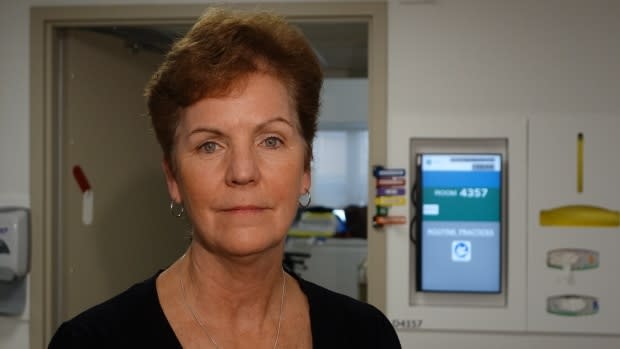'Bed blockers' costing Ottawa hospitals millions

On a typical day, Ottawa hospitals spend more than a quarter of a million dollars caring for patients who are occupying beds they don't really need.
Over the course of a week, the cost of caring for those so-called "bed blockers" — patients who should be receiving a more appropriate level of care elsewhere, but who are left languishing in hospitals because they have nowhere else to go — amounts to nearly $1.8 million.
CBC analyzed data provided by Ottawa's three acute care hospitals regarding "alternate level of care" (ALC) patients for Oct. 23, 2019 — a date chosen to reflect the typical strain on hospitals just before flu season kicks in.
ALC patients occupy hospital beds despite being medically stable and requiring virtually no health care. Often, they're simply waiting for space to open up in a long-term care home, or to return home with the support of community health services.
On that Wednesday, there were 292 ALC patients occupying beds in Ottawa's three acute care hospitals, costing the hospitals a combined total of $252,640. The total number of ALC patients at the three hospitals on Oct. 23 could have filled all 264 beds at the Queensway Carleton Hospital, and there would still have been 24 without a bed.
The average length of their stays varies from 19 days at the Ottawa Hospital to 172 days at the Queensway Carleton, costing tens of millions of dollars over the course of a year — as much as $75 million, according to one calculation.
'A chess game'
Leah Levesque, vice-president of patient care and chief nursing executive at the Queensway Carleton, said the situation qualifies as a "crisis" because it affects not only the ALC patients, but the people who need the beds they're occupying.
"We're absolutely out of space, and we are very concerned. I'm personally worried about an adverse event for a sick patient in the emergency department who we can't get to the right place," Levesque said.
The hospital's ALC unit is routinely overflowing, with patients occupying areas such as the CAT-scan waiting room. On many weekdays, elective surgeries such as hip and knee replacements are cancelled because an ALC patient is occupying a bed in the surgical wing, Levesque said.
"It's just like a chess game, and you're moving people into different locations," she said.

It's a similar scene at the Montfort Hospital, where ALC patients occupied three dozen beds on Oct. 23.
"It really is a daily struggle because it's like working with 36 less beds," said Sophie Parisien, clinical director of emergency and patient flow at the Montfort.
"It's concerning for everyone to meet the needs of all our patients, including those coming out of surgery and those in the emergency department."
Parisien said the hospital stopped cancelling elective surgeries a little more than two years ago, and promised patients they wouldn't wait more than five hours for a bed after an operation.
"But that has meant we've had to open beds which we don't have the funding for," Parisien said.
Ottawa Hospital spends $43M a year
Dr. Alan Forster, vice-president of innovation and quality at The Ottawa Hospital, doesn't like the term "bed blocker," nor does he call them ALC patients. He refers to them as "patients who are waiting."
Whatever you call them, they occupied 15 per cent of the hospital's 1,232 beds during the 2018-19 fiscal year, at a cost CBC has calculated at $43 million.
"The resources are used for those who are waiting, and therefore it means there is less money for the acute care patients," Forster said. "That means people have to wait in the emergency department, and they have to wait for surgery."

Government seeks 'innovative' solutions
The Ontario government has promised to provide 15,000 new long-term care beds in the province over five years. A report released in October by the province's Financial Accountability Office found that given the aging population, that will still leave the system 2,000 beds short.
Ontario Health Minister Christine Elliott said her ministry is looking at other "innovative ways" to ease the strain, including negotiating with retirement homes that have empty beds to see whether ALC patients could move in temporarily.
She also pointed to two special facilities in Toronto where ALC patients are transferred until they can go home or to a long-term care facility.
"We have found that when ALC patients are moved to reactivation care centres where they get rehab and social integration, which they don't get in the hospital setting, a number of them are able to go home who might have otherwise gone to long-term care," Elliott said.
There are no such facilities in Ottawa, but Elliott said the government is looking at possible sites that could be converted.


